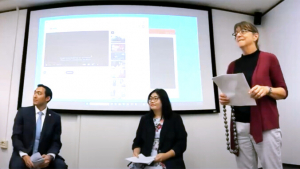
The University of Hawaiʻi at Mānoa is expanding its Careers in Asia-Pacific Affairs (CAPA) initiative this fall, providing students with valuable skills and knowledge to pursue careers in government, education, business, and the nonprofit sector related to the Asia-Pacific region. Launched in October 2023 by the School of Pacific and Asian Studies (SPAS), CAPA aims to bolster career readiness and professional development opportunities for UH Mānoa students.
- Related UH News story: New Asia-Pacific affairs career initiative in motion, October 10, 2023

This semester, CAPA is rolling out a new webinar speaker series, beginning with “International Education Careers: Nothing Adventured, Nothing Attained” on September 18 at 3 p.m. via Zoom. (Register here)
“Our first CAPA talk of the fall series will feature UH Mānoa alumni who have teaching careers overseas,” said Teri Skillman, associate director at UH Mānoa Center for Southeast Asian Studies (CSEAS). “They will speak about their process of obtaining a job, the value of the UH degree, and the importance of their language skills in their education career.”
Strategic grant funding
The CAPA initiative complements the Indo-Pacific Affairs Initiative in SPAS, supported by Congressionally-directed funding from 2022–25, which aims to strengthen UH Mānoa’s expertise in Asia and the Pacific Islands. This funding supports various components, including the newly established Center for Indo-Pacific Affairs, paid internships, visiting experts, and enhanced educational and professional development opportunities.
A key component of CAPA is a $1.13 million grant from the International Foreign Language and Area Studies Office of the U.S. Department of Education, which designates CSEAS as a National Resource Center (NRC). This funding aims to enhance career readiness using Southeast Asian languages and area studies expertise.
“The absolute priorities for the grant align with the UH system career readiness priorities and with the state’s Work-Based Learning P20 Partnerships for Education program,” said Miriam Stark, director at CSEAS. “This is an effort to enhance career readiness using Southeast Asian languages and area studies expertise to succeed in the workplace and meet national needs.”
Inaugural course
This fall, CAPA also introduced its first course, ASAN 305: Career Pathways in Asian Studies, which explores various careers related to Asian studies and helps students develop the skills needed to translate academic success into meaningful careers.
“It’s a hands-on course that draws on our recent research on Asia-related workforce needs and alumni placements, putting those research results to practical use for our students,” said Cathryn Clayton, an associate professor and chair of Asian studies who developed and teaches the course.
CAPA’s upcoming events include workshops on civic engagement, funding opportunities, and publication writing, providing students with comprehensive resources to navigate Asia-Pacific related careers.

